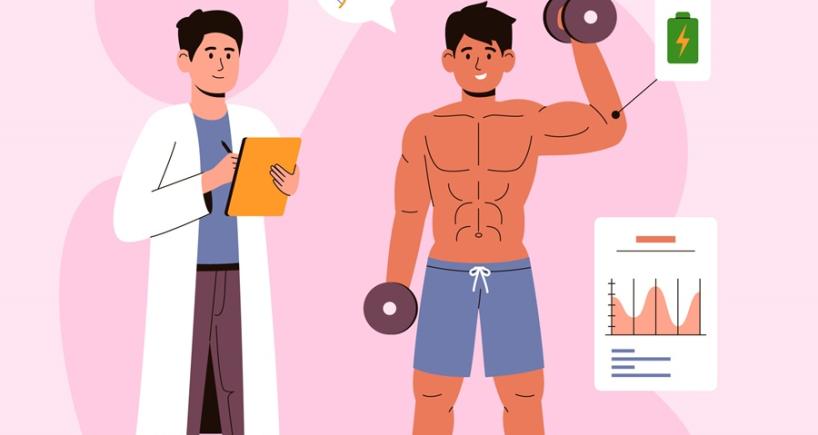
Understanding Low Testosterone: Symptoms, Diagnosis & Treatment
Introduction
With age, the production of the male hormone called testosterone declines in men, leading to hypogonadism. This condition can affect men in as early as their fourth or fifth decade of life. A recent study suggests that low testosterone levels may not only impact sexual health and muscle mass but also increase the risk of chronic diseases in men. Understanding the causes, symptoms, and treatment options for low testosterone is crucial for men to maintain overall health and well-being.
Reasons for Low Testosterone
- Medical Conditions: Certain medical conditions contribute to low testosterone levels. These conditions may include underlying health issues such as obesity, diabetes, metabolic syndrome, and chronic illnesses like HIV/AIDS.
- Stress: High-stress levels, whether emotional or physical, can disrupt the production of hormones, including testosterone.
- Pituitary Gland Problems: Dysfunction of the pituitary gland can affect hormone regulation, including testosterone production.
- Testicular Issues: Problems with the testicles, which produce testosterone, can result in low testosterone levels. These issues may stem from congenital conditions, infections, trauma, or treatments such as radiation therapy or chemotherapy.
- Aging: Testosterone levels decline naturally with age, typically starting around the fourth or fifth decade of life. This age-related decline in testosterone production is a normal part of aging but can vary among individuals.
Hypogonadism - A Significant Health Concern
- Low testosterone, or hypogonadism, is gaining recognition as a significant health issue, especially among older men. As the population ages, hypogonadism’s prevalence is expected to rise. It is closely linked with various health conditions, such as obesity, type 2 diabetes, hypertension, osteoporosis, and metabolic syndrome.
- Research findings from literature reviews highlight strong associations between hypogonadism and sexual dysfunction as well as cognitive impairment.
- Recent research has revealed a heightened risk of all-cause mortality, coronary artery disease, and stroke in individuals with untreated hypogonadism. These insights underscore the importance of identifying and managing low testosterone levels to mitigate potential health complications and enhance the overall well-being of the affected individuals.
Symptoms
Symptoms of low testosterone (hypogonadism) manifest differently depending on age. Some of them include:
- Sexual Dysfunction: Including erectile dysfunction, reduced libido, diminished penile sensation, difficulty achieving orgasm, and reduced ejaculation
- Decreased Energy and Stamina: Resulting in fatigue and reduced physical endurance
- Mood Changes: Such as depressed mood, irritability, and difficulty concentrating
- Metabolic Changes: Alterations in cholesterol levels, increased abdominal adiposity, incomplete sexual development, and aspermia
For a diagnosis of hypogonadism, serum testosterone levels should be below 300 ng/dL, accompanied by at least one clinical sign or symptom indicative of the condition. Other signs include muscle wasting, reduced bone mass, and oligospermia.
Diagnosing Hypogonadism Involves Several Key Steps and Considerations
Many men with low testosterone levels may show no symptoms and appear healthy. Therefore, diagnosis should not rely solely on symptoms. It should also include objective measurements.
- Multiple Testosterone Measurements: Testosterone levels fluctuate throughout the day, peaking in the morning. Therefore, blood samples are usually drawn early in the morning for accurate measurement.
- Diagnostic Process: Diagnosis typically involves symptom assessment and blood work, mainly focusing on testosterone levels. The Androgen Deficiency in Aging Males (ADAM) test, a 10-item questionnaire, may be used as an initial screening tool.
- Further Testing: If low testosterone levels are confirmed, additional tests are performed to determine the underlying cause, which may involve assessing hormone levels, semen analysis, pituitary imaging, testicular biopsy, and genetic studies.
Importance of Early Diagnosis and Treatment
Early identification and treatment of hypogonadism can help reduce the associated risks. In young boys, early detection can prevent complications from delayed puberty, while in men, it can mitigate the development of osteoporosis and other related conditions.
Treatment
Treatment options for low testosterone (hypogonadism) aim to restore physiological testosterone levels and address associated symptoms. Here’s a breakdown of the available treatments:
- Testosterone Replacement Therapy (TRT): TRT is an option for men with low testosterone levels. It aims to enhance sexual function, energy levels, mood, and muscle mass. Delivery methods include injections, patches, and gels. Some of the factors to consider before TRT are as follows:
- Before starting testosterone replacement therapy, it is crucial to determine the causes of hypogonadism and to assess if it is functional or organic.
- Organic hypogonadism stems from congenital/developmental, destructive, or infiltrative disorders of the hypothalamus, pituitary gland, or testes, resulting in permanent hypogonadism.
- Functional hypogonadism arises from non-destructive suppression of hypothalamic, pituitary, or, occasionally, testis function. This form of hypogonadism may be reversible or treatable and often presents with potentially reversible or treatable clinical symptoms. Drug-induced primary hypogonadism is a notable example of functional hypogonadism.
- Implantation of Pellets: Small pellets that release testosterone gradually over several months can be implanted. This option is suitable for individuals experiencing significant benefits from testosterone therapy.
- Addressing Pituitary Issues: If hypogonadism stems from a pituitary problem, surgical interventions or replacement pituitary hormones may be necessary.
Each treatment option has its own benefits and side effects, and the choice depends on factors like patient preference, adherence, and individual response to therapy. However, close monitoring and follow-up with a consultant physician is essential for ensuring optimal testosterone levels and symptom management.
Prevention and Lifestyle Modifications
Addressing low testosterone levels through prevention and lifestyle modifications is crucial for maintaining overall health and well-being in men. While testosterone replacement therapy remains an option, adopting the following healthy habits can help prevent or mitigate the risk of developing hypogonadism.
- Healthy diet
- Regular exercise
- Weight management
- Stress management
- Adequate sleep
- Limited alcohol intake
- Avoiding substance abuse
- Regular medical check-ups
Early detection and treatment of low testosterone levels are vital for men’s health. Alongside medical interventions like testosterone replacement therapy, incorporating healthy lifestyle habits can play a significant role in preventing and managing hypogonadism effectively.
Popular Searches :
Hospitals: Cancer Hospital in Delhi | Best Heart Hospital in Delhi | Hospital in Amritsar | Hospital in Ludhiana | Hospitals in Mohali | Hospital in Faridabad | Hospitals in Gurgaon | Best Hospital in Jaipur | Hospitals in Greater Noida | Hospitals in Noida | Best Kidney Hospital in Kolkata | Best Hospital in Kolkata | Hospitals in Rajajinagar Bangalore | Hospitals in Richmond Road Bangalore | Hospitals in Nagarbhavi Bangalore | Hospital in Kalyan West | Hospitals in Mulund |
Doctors: Dr. Rana Patir | Dr. Rajesh Benny | Dr. Rahul Bhargava | Dr. Jayant Arora | Dr. Anoop Misra | Dr. Manu Tiwari | Dr. Praveer Agarwal | Dr. Arup Ratan Dutta | Dr. Meenakshi Ahuja | Dr. Anoop Jhurani | Dr. Shivaji Basu | Dr. Subhash Jangid | Dr. Atul Mathur | Dr. Gurinder Bedi | Dr. Monika Wadhawan | Dr. Debasis Datta | Dr. Shrinivas Narayan | Dr. Praveen Gupta | Dr. Nitin Jha | Dr. Raghu Nagaraj
Specialities: Heart Lung Transplant | Orthopedic |











